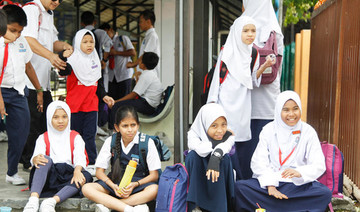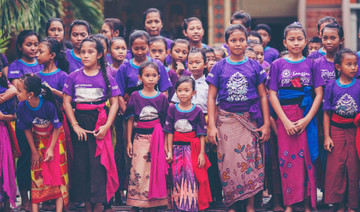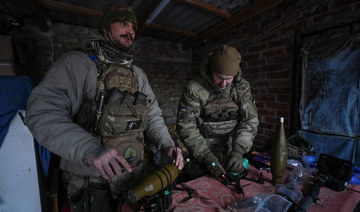LONDON: When Zee was 13, she returned from school one day to find an engagement party under way at her home in northern England, but her excitement at the celebrations quickly turned to shock.
“I asked my mum who’s getting married. She said, ‘It’s you’,” Zee told the Thomson Reuters Foundation.
Her betrothed was represented by a photo – an older cousin she had never met who lived in Afghanistan, her parents’ country of birth.
“One day I’m not even allowed to talk to boys and the next I’m told I’m getting married,” Zee said.
“I was dressed up to look like a Christmas tree — very sparkly, very bling. Everyone was happy. The only person who was miserable was me.”
Child marriage — defined internationally as marriage under 18 — remains legal in Britain. In England, Wales and Northern Ireland, teenagers can wed at 16 with parental consent. In Scotland, they do not need consent.
Zee, who did not want to give her full name, escaped by running away from home, but she says many girls are still being pushed into marriage.
Campaigners say it is time that Britain — which has been vocal about ending child marriage in developing countries — got its own laws in order.
They were particularly dismayed when Bangladesh changed its law recently to allow marriage at 16 — and cited British law as a justification.
“The UK should practice what it preaches,” said Mabel van Oranje, chairwoman of global advocacy group Girls Not Brides.
“Britain’s delay in reforming its own marriage laws is increasingly counterproductive.”
British parliamentarian Pauline Latham agrees. She has introduced a bill to raise the marriage age to 18 which is set to receive its second reading later this year.
She said it was “crazy” that Britain still allowed child marriage when it was spending about 39 million pounds ($51 million) over five years to support efforts to end it in developing countries.
Changing the law was also crucial for protecting girls at home, she said.
FORCED MARRIAGE
Nearly 2,000 young people in Britain, the vast majority of them girls, were wed before the age of 18 between 2010 and 2015, according to official data.
Although the numbers are low, campaigners believe most are pressured into marriage by their families. If the minimum age was raised, girls would be more empowered to say no.
Girls Not Brides says the impact of getting married young is similar wherever girls live. They are more likely to drop out of school and at greater risk of marital rape, domestic abuse and health problems relating to teenage pregnancy.
The minimum age of 16 was set in 1929 when living together or falling pregnant out of wedlock was socially unacceptable. But campaigners said the “parental consent” clause for under 18s had now become an “open door” to forced marriage.
Latham said there was general support in parliament for raising the marriage age, but her bill may not be heard due to lack of time.
If so, she will push ministers to insert an amendment into another bill. Campaigners suggest it could be included in the Domestic Violence Bill.
SACRIFICED LIFE
Girls from South Asian and Middle Eastern backgrounds are seen as most at risk of early marriage in Britain because having relationships outside marriage is often considered shameful.
Amina, a mother of four in her thirties from London, had never talked to her husband before her wedding just after her 17th birthday.
The marriage, done to please her parents, put an end to her studies and plunged her into depression as she dealt with her husband’s temper and controlling mother-in-law.
“The marriage was all about fear. I was a total stranger in my own house,” said Amina. “I was really naive. I felt like a child myself when I had my first children.”
Amina, whose parents were born in Bangladesh, says girls are still coerced into early marriages in Britain.
“It was a big sacrifice of my life. I had no chance to explore things. I went through terrible times,” said Amina, who is still married to her husband and asked not to use her real name.
Campaigners say official marriage statistics do not reflect the true scale of the problem as many girls are married early in traditional ceremonies, but the weddings are not officially registered.
Others are taken abroad for marriage and brought back to Britain when they are older.
Last year, the government’s Forced Marriage Unit received reports of about 1,200 possible cases of people, mostly girls and women, being coerced to wed — a figure widely said to represent the tip of the iceberg.
Nearly 30 percent of cases where the age was known concerned minors, and over half of these involved children under 16.
Britain banned forced marriage in 2014. It has taken action to rescue girls from abroad, prosecuted parents and issued forced marriage protection orders.
Campaigners say it makes no sense to invest in tackling forced marriage, while retaining a law that facilitates it.
“It’s an anomaly. We need to address it — and the time is now,” Latham said. ($1 = 0.7603 pounds)























